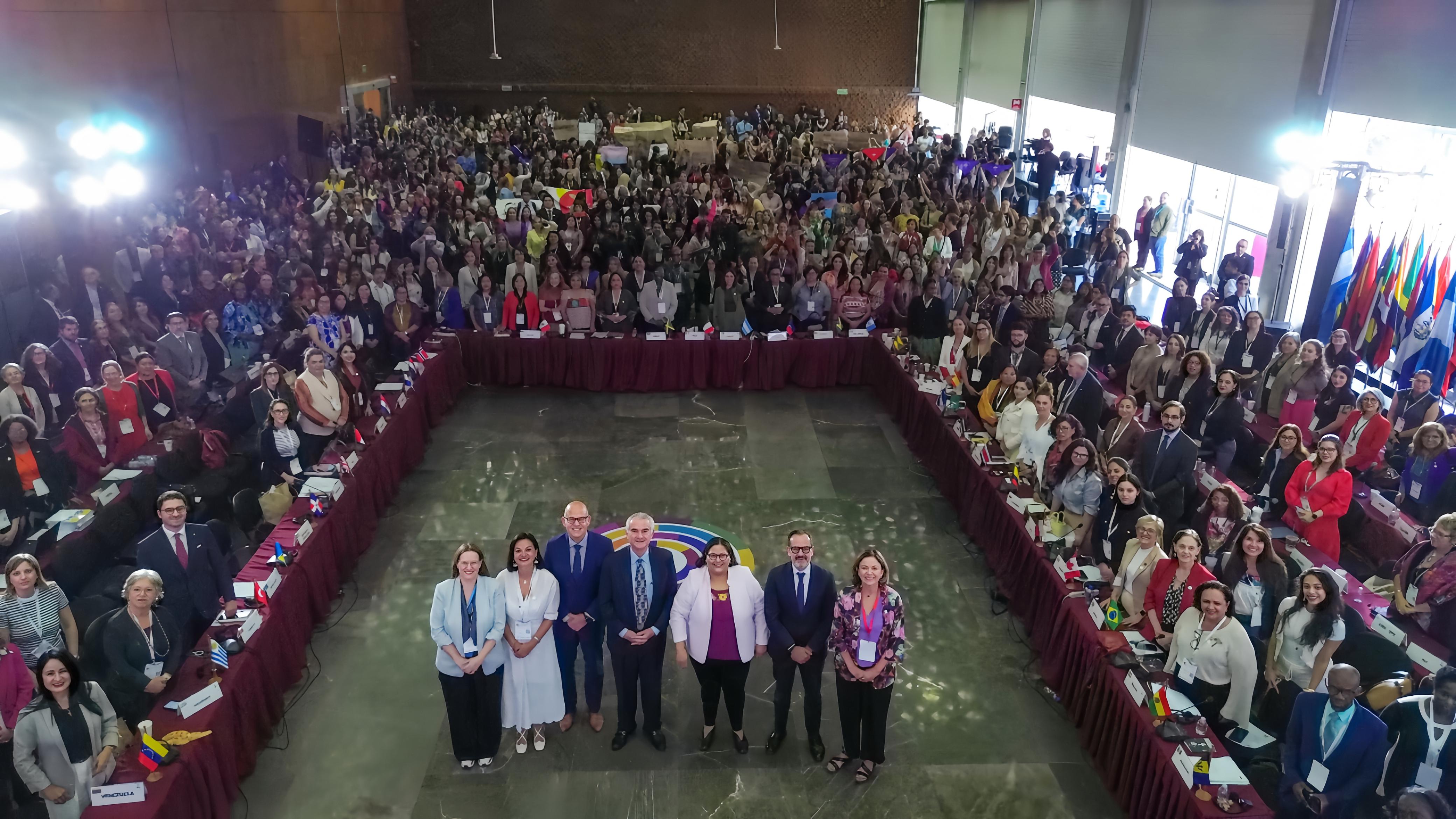Latin American and Caribbean Countries Approved the Tlatelolco Commitment, which Establishes a Decade of Action to Achieve Substantive Gender Equality and the Care Society
Work area(s)
Today the XVI Regional Conference on Women in Latin America and the Caribbean ended in Mexico City, having been organized by ECLAC in coordination with UN Women, under the leadership of the Government of Mexico as Chair.

The Member States of the Economic Commission for Latin America and the Caribbean (ECLAC), participating in the XVI Regional Conference on Women in Latin America and the Caribbean, approved this Friday, August 15, 2025 the Tlatelolco Commitment, which establishes a decade of action (2025-2035) in Latin America and the Caribbean to accelerate the achievement of substantive gender equality and the care society through political, economic, social, cultural and environmental transformations.
In the agreement, the countries recognize that the care society proposal that Latin America and the Caribbean is contributing to the world is a new paradigm for sustainable development, equality and peace that prioritizes the sustainability of life and the care of people and the planet. And they commit themselves to promoting measures to overcome the sexual division of labor and move towards a fair social organization of care.
In addition, they recognize in the resolution “the human right to care, which comprises the right to provide and receive care and to exercise self-care, based on the principles of equality, universality and social and gender co-responsibility, and which therefore constitutes an obligation of the State and a responsibility that must be shared by persons of all sectors of society, men and women, families, communities and the private sector.”
The main intergovernmental forum within the United Nations focused on women's rights and gender equality in the region was inaugurated on Tuesday by the President of Mexico, Claudia Sheinbaum, and brought together delegates from 35 Member States and associate members of ECLAC, along with representatives of 21 United Nations agencies and 19 intergovernmental organizations. They were joined by women parliamentarians from 22 of the region’s countries and around 600 members of civil society, mainly representatives of women’s and feminist organizations and movements. Nearly 1,200 people participated in total [1].
Speaking at the closing session were Amina J. Mohammed, Deputy Secretary-General of the United Nations (virtually); Citlalli Hernández Mora, Minister for Women of Mexico; Enrique Ochoa, Deputy Minister of Multilateral Affairs and Human Rights at the Ministry of Foreign Affairs of Mexico; José Manuel Salazar-Xirinachs, Executive Secretary of ECLAC; and María-Noel Vaeza, Regional Director for the Americas and the Caribbean of the United Nations Entity for Gender Equality and the Empowerment of Women (UN Women).
“This week you leave inspired by each other and ready to take that energy to the real world,” stated Amina J. Mohammed, Deputy Secretary-General of the United Nations, stressing that the time for promises is over and action is needed. “The care society matters. Latin America and the Caribbean has given the world something extraordinary: the vision of a care society that is a complete paradigm shift,” she indicated. She added that “investing in care is not a cost, it is a catalyst for equality, democratic transformation and sustainable development.”
Citlalli Hernández Mora, Minister for Women of Mexico, said that "today we set a historic milestone: the Spanish name of the Conferencia Regional sobre la Mujer de América Latina y el Caribe is now the Conferencia Regional sobre las Mujeres (in the plural)," and she emphasized that “the Tlatelolco Commitment is a road map for the coming years, and it is also a declaration of principles, of the fact that Latin America and the Caribbean does not renounce its right to exist as a diverse, sovereign, solidarity-focused and deeply feminist region. And that we do not accept rollbacks, we do not tolerate impunity, and we will build, through our activism and our alliances, a care society as the basis for peace, justice, equity and the future.”
“Moving towards a care society is not only possible, it is essential. The 21st century will undoubtedly be the century in which we manage to universalize the right to care. The next decade will be key to achieving the momentous push for this to occur. Acting today sows the seeds of hope. Reaching this goal requires intergenerational collective action, care policies and a care approach in all public policies, strategic investments and regional cooperation. This is an urgent and unequivocal call. You can count on me, and on ECLAC, on the perseverance of our regional efforts, to travel this path along with you and to achieve this vital transformation,” affirmed José Manuel Salazar-Xirinachs, ECLAC’s Executive Secretary.
Deputy Minister Enrique Ochoa, meanwhile, said that “the conclusion of this sixteenth Regional Conference on Women in Latin America and the Caribbean is in reality the start of multiple processes in our countries and our communities to build the care societies that we have set out for ourselves with the Tlatelolco Commitment,” and he highlighted “Latin America and the Caribbean’s commitment to multilateralism and to a more just and peaceful world.”
María-Noel Vaeza, Regional Director of UN Women, stated that “it is excellent news to close this Sixteenth Regional Conference on Women in Latin America and the Caribbean with the Tlatelolco Commitment. This is the result of the efforts of ministers, high-level authorities, presidents of gender entities, and heads of delegation from the countries to reach an ambitious and innovative agreement to drive transformations in the political, economic, social, cultural and environmental spheres to promote the care society and gender equality. In this convulsed world, in such a challenging context where the only constant is change, I welcome the vision and commitment with which all of us in feminist, women’s and civil society organizations, governments, and the entire United Nations system, at ECLAC and UN Women, have embraced the strategic vision of the care society with determination.”
In the Tlatelolco Commitment, countries vowed to “adopt regulatory frameworks and comprehensive care policies, programs and systems with an intersectional and intercultural perspective that are sustainable over time, that respect, protect and fulfill the rights of those who receive and provide paid and unpaid care, that prevent all forms of violence in formal and informal work, ensure women’s full, equal and meaningful participation in public and political life and the economy and free up time for women, so that they can engage in employment and education, and enjoy their autonomy to the fullest.”
In that regard, the representatives welcomed Advisory Opinion 31 of 2025 issued by the Inter-American Court of Human Rights that recognizes the existence of a stand-alone human right to care in its three dimensions: receiving care, providing care and exercising self-care, and encouraged the region’s governments to respect and ensure this right, and to adopt legal and other measures to ensure its complete fulfillment.
In the agreement, the countries recognize that the current social organization of care in Latin America and the Caribbean is unjust and unequal, and historically has affected, in particular, indigenous and Afrodescendent women, adolescents and girls. They further express concern about the current threats to multilateral bodies and the reduction of funds allocated to them, along with the worsening economic, social and environmental situation resulting from multiple and interrelated international crises.
They also commended the relaunch of the Gender Equality Observatory for Latin America and the Caribbean and welcomed the position paper presented by ECLAC at the meeting, The Care Society: Governance, Political Economy and Social Dialogue for a Transformation with Gender Equality, which offers recommendations for advancing the care society paradigm and addressing the care crisis. They further commended the preparation of the document Guidelines for care policies from a gender, territorial and intersectional perspective, by ECLAC, UN Women, the International Labour Organization and the United Nations Development Programme.
The resolution includes numerous specific commitments related to issues such as: the normative framework, the institutional architecture, participation and strengthening of State capacities; financing and cooperation; and information systems, communication, technology, monitoring, evaluation and accountability.
They also reiterated their commitment to gender parity in the most senior positions of the United Nations system, including that of Secretary-General, with a view to its being held, for the first time in history, by a woman, underscoring the representation of women from Latin America and the Caribbean and the region’s decisive role in promoting gender equality in the multilateral system.
The countries decided that the name of the Conference in Spanish will be changed to Conferencia Regional sobre las Mujeres de América Latina y el Caribe, which will be submitted for consideration at the thirty-eighth session of ECLAC’s Committee of the Whole, due to take place in New York in October 2025. They also requested that ECLAC establish a multi-stakeholder international cooperation program that convenes Member States, cooperation entities and other partners to support the decade of action, 2025–2035, to achieve substantive gender equality and the care society.
Finally, the delegates thanked the people and Government of Mexico for hosting the XVI Regional Conference on Women in Latin America and the Caribbean, and welcomed the offer by the Government of Colombia to serve as host of the next Conference, which will be held in 2028.
The Regional Conference on Women’s Presiding Officers for the next three years is made up of Mexico as Chair and Antigua and Barbuda, Chile, Colombia, Costa Rica, Cuba, the Dominican Republic, Grenada, Haiti and Uruguay as Vice-Chairs.
[1] This paragraph was edited due to an update in participant numbers.
Related event

XVI Regional Conference on Women in Latin America and the Caribbean
<p>The sixteenth session of the Regional Conference on Women in Latin America and the Caribbean was held at the Centro Cultural Universitario Tlatelolco in Mexico City, from 12 to 15 August 2025, and…
Related content
The Care Society: Governance, Political Economy and Social Dialogue for a Transformation with Gender Equality
Presentation by ECLAC Executive Secretary, José Manuel Salazar-Xirinachs, at the XVI Regional Conference on Women in Latin America and the Caribbean.
Subregional headquarter(s) and office(s)
Contact
Public Information Unit
- prensa@cepal.org
- (56 2) 2210 2040
